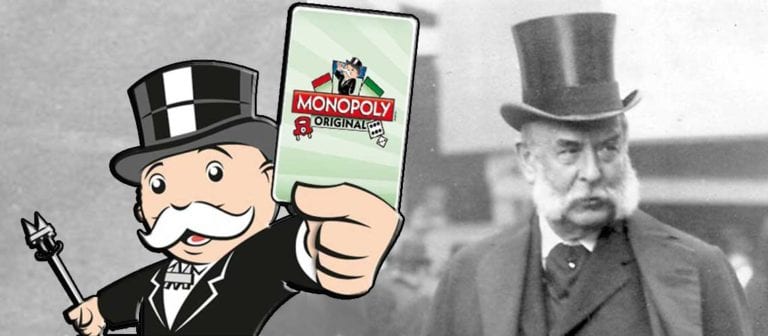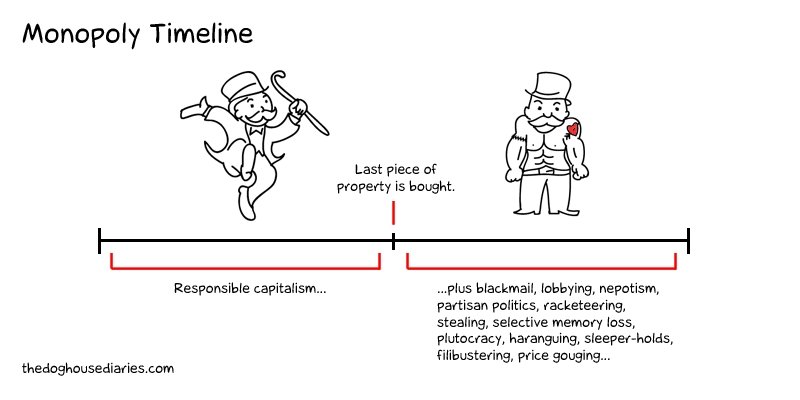
In protest of this, she posted a newspaper advertisement trying to auction herself off as a “Young woman American slave” looking for a husband who could own her. When she was working as stenographer she was making a measly wage that she had no way of supporting herself on without marrying a man and becoming a kept woman. Magie was a big believer in Georgism, and she wasn’t the type of person to keep her beliefs to herself. This was a pretty enticing system for a lot of progressive political leaders because it was seen to motivate land cultivation, it put money in the hands of those who had low socioeconomic standing and it got rid of the idea that landowners and landlords held all the power of the land that citizens used despite not really contributing to anything that was made on that land. Georgism wanted to tax the value of the land itself across the country to fund the American government, after which any leftover funds could then be equally and fairly distributed among the citizens of the state. In general, Americans weren’t massive fans of being taxed. The US was in a place where if you owned land you were sorted - and if you didn’t you were at the whims of whoever owned the land you were on.Įlizabeth Magie, inventor of The Landlord's Game. Georgists believe that instead of the standard method of taxation where a percentage is taken from income or capital or whatever source that comes straight from the work of those producing value in the economy, there should instead be a universal land tax that increases or decreases based on the usefulness, size and location of owned land in the state.īear in mind that this is a time where land ownership was basically the entirety of economic value in the country. She was a woman that believed in equality, a staunch feminist and political activist, as well as a believer in the principles of Georgism - the economic ideology developed from the writings of Henry George that was popular among some political theorists of the time. It was ultimately game design that would take her focus. Magie was looking for an effective way to espouse the virtues of Georgism. This was a time where women were credited with less than 1% of all patents filed.

In fact, at the age of just 26, Maggie received a patent for an invention of her own design that eased the process of typewriting, something she was intimately familiar with due to her time as a stenographer in the early 1880s. Magie was somewhat of a jack of all trades, dipping her toes into all sorts of pastimes and professions, from poetry, comedy and theatre to engineering. Magie, who would spend the 1850s accompanying Abraham Lincoln during the Lincoln-Douglas debates around Illinois, Elizabeth was no stranger to progressive politics from an early age. Born to newspaper publisher and abolitionist James K. To start we’re going to have to go all the way back to 1903 - to when Monopoly was known by an entirely different name.Įlizabeth Magie was an American game designer, writer and inventor born in Illinois in 1866. So why is that? What’s so bad about Monopoly? Why does it harbor so much disdain? Well, it’s a complicated thing to explain. Despite its mainstream appeal, ask most big board game fans if they want to play a game of Monopoly and they’ll likely roll their eyes or grimace at the mere suggestion. But that couldn’t be further from the truth. If you say you’re into board games, it’s not unlikely someone will assume you spend your nights playing Monopoly with your mates.

If you want an example of just how omnipresent it is, there’s even a McDonald's Monopoly promotion. And yet, to this day, Monopoly is still one of the largest board games in the world - available in 37 different languages in toy and book shops the world over.


We’ve seen massive innovations in play and design across the industry, whole new genres lift their heads from the primordial soup and designs that would literally not have been possible at the time Monopoly was first published.īoard games, and everything related to them, are better now than they have ever been. Tabletop games have come a long way since the 1930s when the Parker Brothers first unleashed the game of Monopoly onto the world.


 0 kommentar(er)
0 kommentar(er)
